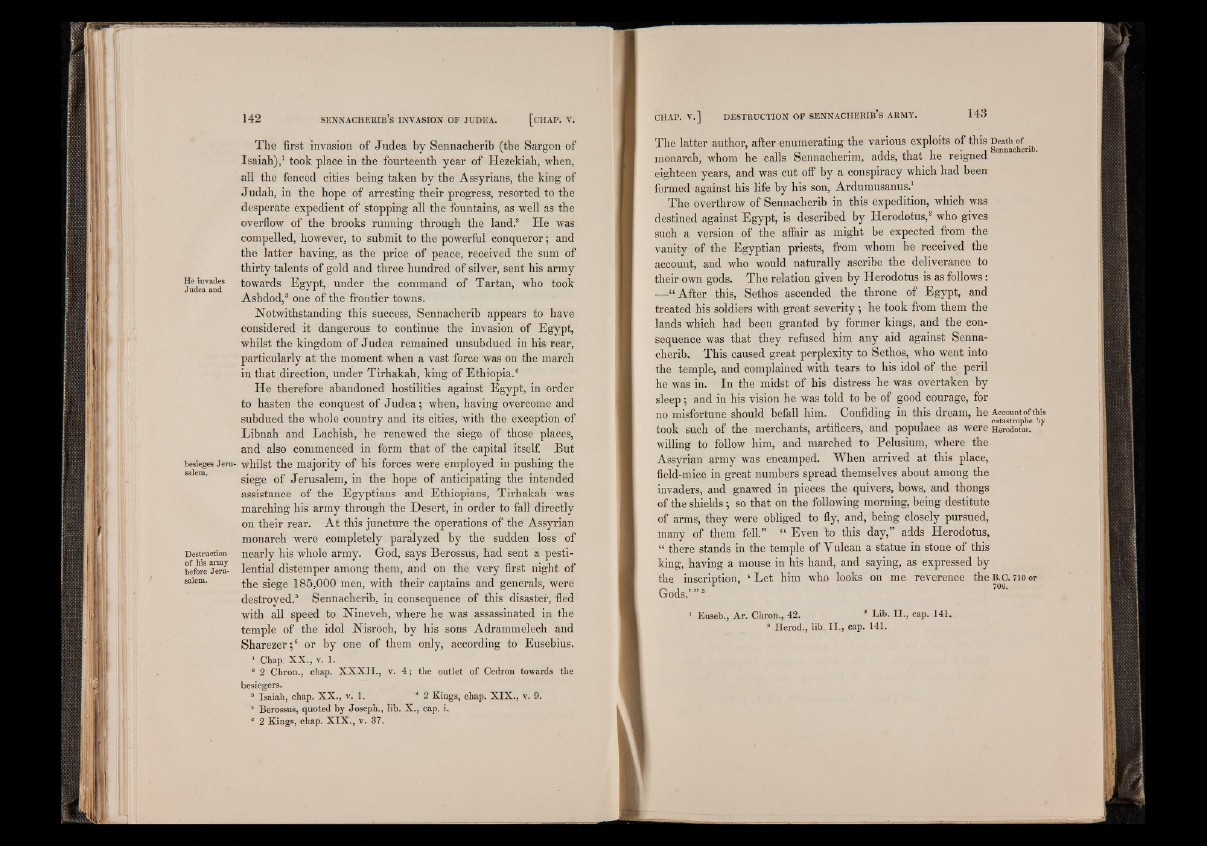
He invades
Judea and
besieges Jerusalem.
Destruction
of his army
before Jerusalem.
The first invasion of Judea by Sennacherib (the Sargon of
Isaiah),1 took place in the fourteenth year of Hezekiah, when,
all the fenced cities being taken by the Assyrians, the king of
Judah, in the hope of arresting their progress, resorted to the
desperate expedient of stopping all the fountains, as well as the
overflow of the brooks running through the land.8 He was
compelled, however, to submit to the powerful conqueror; and
the latter having, as the price of peace, received the sum of
thirty talents of gold and three hundred of silver, sent his army
towards Egypt, under the command of Tartan, who took
Ashdod,3 one of the frontier towns.
Notwithstanding this success, Sennacherib appears to have
considered it dangerous to continue the invasion of Egypt,
whilst the kingdom of Judea remained unsubdued in his rear,
particularly at the moment when a vast force was on the march
in that direction, under Tirhakah, king of Ethiopia.4
He therefore abandoned hostilities against Egypt, in order
to hasten the conquest of Judea; when, having overcome and
subdued the whole country and its cities, with the exception of
Libnah and Lachish, he renewed the siege of those places,
and also commenced in form that of the capital itself. But
whilst the majority of his forces were employed in pushing the
siege of Jerusalem, in the hope of anticipating the intended
assistance of the Egyptians and Ethiopians, Tirhakah was
marching his army through the Desert, in order to fall directly
on their rear. At this juncture the operations of the Assyrian
monarch were completely paralyzed by the sudden loss of
nearly his whole army. God, says Berossus, had sent a pestilential
distemper among them, and on the very first night of
the siege 185,000 men, with their captains and generals, were
destroyed.5 Sennacherib, in consequence of this disaster, fled
with all speed to Nineveh, where he was assassinated in the
temple of the idol Nisroch, by his sons Adrammelech and
Sharezer;6 or by one of them only, according to Eusebius.
1 Chap X X ., v. l .
a 2 Chron., chap. X X X I I ., v. 4 ; the outlet of Cedron towards the
besiegers.
3 Isaiah, chap, X X ., v. 1. * 2 Kings, chap. X IX ., v. 9.
5 Berossus, quoted by Joseph., lib. X., cap. i.
6 2 Kings, chap. X IX ., v. 37.
The latter author, after enumerating the various exploits of this <ij. rh
monarch, whom he calls Sennacherim, adds, that he reigned
eighteen years, and was cut off by a conspiracy which had been
formed against his life by his son, Ardumusanus.1
The overthrow of Sennacherib in this expedition, which was
destined against Egypt, is described by Herodotus,2 who gives
such a version of the affair as might be expected from the
vanity of the Egyptian priests, from whom he received the
account, and who would naturally ascribe the deliverance to
their own gods. The relation given by Herodotus is as follows:
—“ After this, Sethos ascended the throne of Egypt, and
treated his soldiers with great severity; he took from them the
lands which had been granted by former kings, and the consequence
was that they refused him any aid against Sennacherib.
This caused great perplexity to Sethos, who went into
the temple, and complained with tears to his idol of the peril
he was in. In the midst of his distress he was overtaken by
sleep; and in his vision he was told to be of good courage, for
no misfortune should befall him. Confiding in this dream, he Account of this
_ . p , i catastrophe by took such of the merchants, artmcers, and populace as were Herodotus,
willing to follow him, and marched to Pelusium, where the
Assyrian army was encamped. When arrived at this place,
field-mice in great numbers spread themselves about among the
invaders, and gnawed in pieces the quivers, bows, and thongs
of the shields ; so that on the following morning, being destitute
of arms, they were obliged to fly, and, being closely pursued,
many of them fell.” “ Even to this day,” adds Herodotus,
“ there stands in the temple of Yulcan a statue in stone of this
king, having a mouse in his hand, and saying, as expressed by
the inscription, ‘ Let him who looks on me reverence theB.c.710or
Gods.’” 3 7Q6‘
1 Euseb., Ar. Chron., 42. 2 Lib. I I ., cap. 141.
3 Herod., lib. I I ., cap. 141.